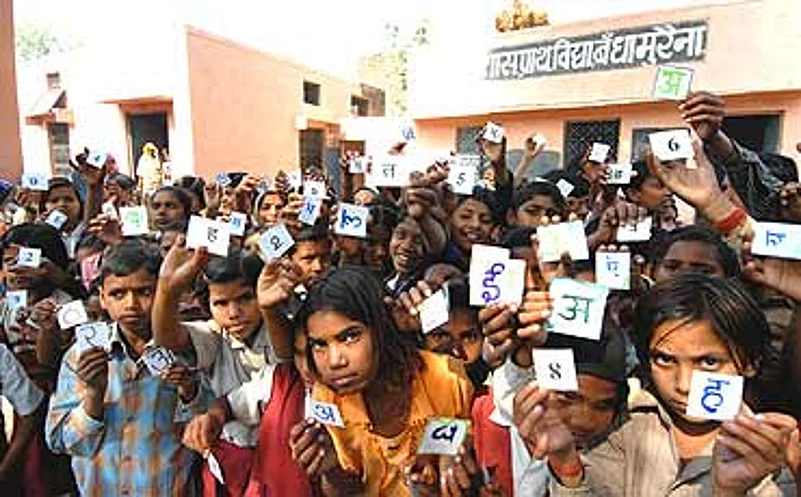- In 2005, NGO Pratham trained 2.5 lakh MP teachers to kickstart learning levels in primary schools. Later, it recruited thousands of volunteers to tutor village kids.
- In 2006, the number of Standard I kids in MP able to recognise letters doubled, compared to 2005, and those who could read words trebled
- In 2006, 70 per cent kids in Standard V in MP could read fluently, compared to 50 per cent in 2005
- MP now only behind Kerala and West Bengal in reading levels in primary schools (The figures are from Pratham's Annual State of Education Reports)
***
- Virtually every house has a rifle or two stashed away, including the teacher's. "Aapas ka vivaad...atmaraksha ke liye hai," Tomar explains. "Aur shauk bhi hai," he adds disarmingly.
- The small talk at the teashops, and even later that evening with district project coordinator (DPC) Vijay Dixit, in charge of primary education in Bhind, is about dacoit gangs, shootouts and kidnappings. The glory days of the Chambal dacoits may be over, but there is enough lawlessness around to fuel both conversation and residual anxiety. (The next day, at a government primary school in Bandha, in adjoining Morena district, it floats to the surface as news filters to teachers of a shooting incident involving one of the student's parents.)
- And, as in "Omkara country", the hardbitten, machismo-driven badlands of western UP—of which this region on the UP-Madhya Pradesh border is an extension—the social indicators for women here are lousy.

It wasn't easy, recalls Usha Rane, who heads Pratham's work in MP. "Initially, the teachers were sceptical. Some of them were post-graduates, our young activists who were training them were not. Hindi was a problem too." There were other roadblocks. In Bhind, for instance, district education officials said in writing that they would not be responsible for the safety of the outsiders, who included women, after 3 pm. In consternation, the NGO moved out its female staff. More seriously, the programme got bogged down in administrative and logistical glitches, like materials not reaching schools on time, upon which Rao was impelled to send out a strong letter asking for support from the education bureaucracy. "Eventually, it worked out," said Rane. "We did win the teachers over...it was they who implemented the programme, we were only the catalysts."
The NGO bills the MP initiative a big success, and cites numbers to make its point. According to the Annual State of Education Reports (ASER), an annual Pratham-coordinated audit of learning levels, 60 per cent of Class I children in MP schools could not recognise letters or words in 2005. The number dropped to 20 per cent in 2006. And 70 per cent of Class V children could read fluently at the end of 2006, compared to just 50 per cent the previous year. In maths too, the reports record similar big jumps. "The programme shows the success of short, sharp bursts of goal-oriented teaching," says Pratham's Rukmini Banerji. "There is not much difference between Kerala 2005 and MP 2006." Not everybody is convinced the jump has been as great as ASER shows—even MP bureaucrats in Bhopal, or on the ground like Dixit, say the huge leap is a surprise—and other studies will clearly be needed to endorse these results. But there's no denying, they all agree, that something good is happening in MP—a state that has of late hit the headlines more for saffronising education rather than reforming it.


























